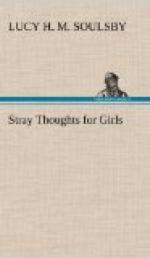Surely R.L. Stevenson should be on the list, for he speaks so splendidly on Carlyle’s great point that man was born for something better than Happiness. He says, over and over again, “Happiness is not the reward that mankind seeks. Happinesses are but his wayside campings; his soul is in the journey; he was born for struggle, and only tastes his life in effort.” He sounds the same note as Marcus Aurelius, another of the de-vulgarizing man-making books of the world.
The message of all these men is, “Love not Pleasure; love God. This is the EVERLASTING YEA, wherein who walks and works it is well with him.”
Surely, when we look into things and leave our hungry wishes on one side, it seems clear to the best side of our nature that we are born, not with a right to Pleasure, but with a right to opportunity for development on our own highest lines.
A pig has a right to pigs-wash—he has no higher capacity. You and I have a capacity for courage and helpfulness and friendship with God. Our life will be a success if these things are developed, and a failure if they are not. This is the success we have a right to, but as likely as not it may need Pain, not Pleasure, for its achievement; and in this case you and I are born with a right to Pain, and we should be defrauded if any one saved us from it.
I know you want Happiness and pleasure, and I sympathize with you; but it makes all the difference to your whole life if you go out into the world like a vulture screaming for prey, or if you start out hoping, in the first place, to be brave and helpful, and, only in the second place, ready to take any pleasure as a good gift to be happy and grateful about.
“How needlessly mean our life is; though we, by the depth of our living, can deck it with more than regal splendour!"[8]
Do you feel that this is very tall talk for quiet lives like yours and mine? Yes, it is; but we need great ideals to live even small lives by. Probably no one of us will ever get near living a noble life, but we can make our lives of the same fibre as those of the heroes. We can live on noble lines.
How?
I.—Let us work for others: which may mean no more than being the useful one in the house and perhaps taking a Sunday-school class.
II.—Let us live with noble people, i.e. read steadily books which keep us in touch with larger minds—if you are constantly meeting clever people that does instead, but if you lead quiet lives with not much to talk about, except gossip and family events, then secure a daily talk with people worth talking to.
III.—Let us live part of each day with God. St. Christopher is the patron saint of those who want to lead a noble, helpful life, and yet feel that in them there lies no touch of saintliness, save it be some far-off touch to know well they are not saints.
You know his story: how he sought to serve the strongest, first the Emperor, then the Devil, then the Crucified; how he went to an old hermit and said, “I am no saint, I cannot pray, but teach me to work for the Master;” and how at last he found that in his common work he attained to the service of the Crucified.




